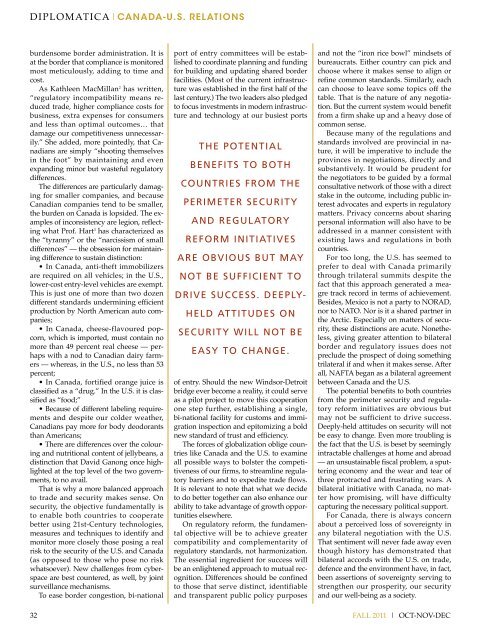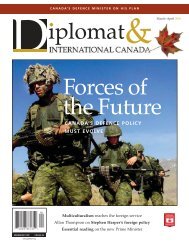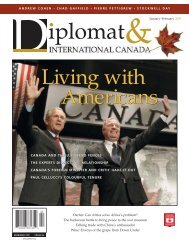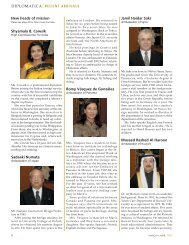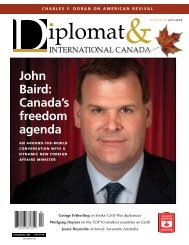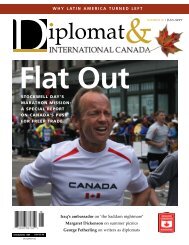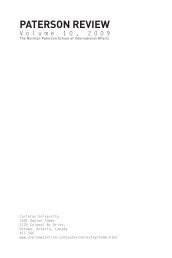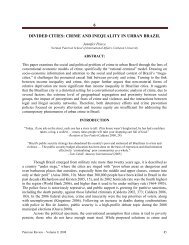the new petro power paradigm - Diplomat Magazine
the new petro power paradigm - Diplomat Magazine
the new petro power paradigm - Diplomat Magazine
You also want an ePaper? Increase the reach of your titles
YUMPU automatically turns print PDFs into web optimized ePapers that Google loves.
DIPLOMATICA|CanadA-U.S. Relations<br />
burdensome border administration. It is<br />
at <strong>the</strong> border that compliance is monitored<br />
most meticulously, adding to time and<br />
cost.<br />
As Kathleen MacMillan 2 has written,<br />
“regulatory incompatibility means reduced<br />
trade, higher compliance costs for<br />
business, extra expenses for consumers<br />
and less than optimal outcomes… that<br />
damage our competitiveness unnecessarily.”<br />
She added, more pointedly, that Canadians<br />
are simply “shooting <strong>the</strong>mselves<br />
in <strong>the</strong> foot” by maintaining and even<br />
expanding minor but wasteful regulatory<br />
differences.<br />
The differences are particularly damaging<br />
for smaller companies, and because<br />
Canadian companies tend to be smaller,<br />
<strong>the</strong> burden on Canada is lopsided. The examples<br />
of inconsistency are legion, reflecting<br />
what Prof. Hart 3 has characterized as<br />
<strong>the</strong> “tyranny” or <strong>the</strong> “narcissism of small<br />
differences” — <strong>the</strong> obsession for maintaining<br />
difference to sustain distinction:<br />
• In Canada, anti-<strong>the</strong>ft immobilizers<br />
are required on all vehicles; in <strong>the</strong> U.S.,<br />
lower-cost entry-level vehicles are exempt.<br />
This is just one of more than two dozen<br />
different standards undermining efficient<br />
production by North American auto companies;<br />
• In Canada, cheese-flavoured popcorn,<br />
which is imported, must contain no<br />
more than 49 percent real cheese — perhaps<br />
with a nod to Canadian dairy farmers<br />
— whereas, in <strong>the</strong> U.S., no less than 53<br />
percent;<br />
• In Canada, fortified orange juice is<br />
classified as a “drug.” In <strong>the</strong> U.S. it is classified<br />
as “food;”<br />
• Because of different labeling requirements<br />
and despite our colder wea<strong>the</strong>r,<br />
Canadians pay more for body deodorants<br />
than Americans;<br />
• There are differences over <strong>the</strong> colouring<br />
and nutritional content of jellybeans, a<br />
distinction that David Ganong once highlighted<br />
at <strong>the</strong> top level of <strong>the</strong> two governments,<br />
to no avail.<br />
That is why a more balanced approach<br />
to trade and security makes sense. On<br />
security, <strong>the</strong> objective fundamentally is<br />
to enable both countries to cooperate<br />
better using 21st-Century technologies,<br />
measures and techniques to identify and<br />
monitor more closely those posing a real<br />
risk to <strong>the</strong> security of <strong>the</strong> U.S. and Canada<br />
(as opposed to those who pose no risk<br />
whatsoever). New challenges from cyberspace<br />
are best countered, as well, by joint<br />
surveillance mechanisms.<br />
To ease border congestion, bi-national<br />
port of entry committees will be established<br />
to coordinate planning and funding<br />
for building and updating shared border<br />
facilities. (Most of <strong>the</strong> current infrastructure<br />
was established in <strong>the</strong> first half of <strong>the</strong><br />
last century.) The two leaders also pledged<br />
to focus investments in modern infrastructure<br />
and technology at our busiest ports<br />
The potential<br />
benefits to both<br />
countries from <strong>the</strong><br />
perimeter security<br />
and regulatory<br />
reform initiatives<br />
are obvious but may<br />
not be sufficient to<br />
drive success. Deeplyheld<br />
attitudes on<br />
security will not be<br />
easy to change.<br />
of entry. Should <strong>the</strong> <strong>new</strong> Windsor-Detroit<br />
bridge ever become a reality, it could serve<br />
as a pilot project to move this cooperation<br />
one step fur<strong>the</strong>r, establishing a single,<br />
bi-national facility for customs and immigration<br />
inspection and epitomizing a bold<br />
<strong>new</strong> standard of trust and efficiency.<br />
The forces of globalization oblige countries<br />
like Canada and <strong>the</strong> U.S. to examine<br />
all possible ways to bolster <strong>the</strong> competitiveness<br />
of our firms, to streamline regulatory<br />
barriers and to expedite trade flows.<br />
It is relevant to note that what we decide<br />
to do better toge<strong>the</strong>r can also enhance our<br />
ability to take advantage of growth opportunities<br />
elsewhere.<br />
On regulatory reform, <strong>the</strong> fundamental<br />
objective will be to achieve greater<br />
compatibility and complementarity of<br />
regulatory standards, not harmonization.<br />
The essential ingredient for success will<br />
be an enlightened approach to mutual recognition.<br />
Differences should be confined<br />
to those that serve distinct, identifiable<br />
and transparent public policy purposes<br />
and not <strong>the</strong> “iron rice bowl” mindsets of<br />
bureaucrats. Ei<strong>the</strong>r country can pick and<br />
choose where it makes sense to align or<br />
refine common standards. Similarly, each<br />
can choose to leave some topics off <strong>the</strong><br />
table. That is <strong>the</strong> nature of any negotiation.<br />
But <strong>the</strong> current system would benefit<br />
from a firm shake up and a heavy dose of<br />
common sense.<br />
Because many of <strong>the</strong> regulations and<br />
standards involved are provincial in nature,<br />
it will be imperative to include <strong>the</strong><br />
provinces in negotiations, directly and<br />
substantively. It would be prudent for<br />
<strong>the</strong> negotiators to be guided by a formal<br />
consultative network of those with a direct<br />
stake in <strong>the</strong> outcome, including public interest<br />
advocates and experts in regulatory<br />
matters. Privacy concerns about sharing<br />
personal information will also have to be<br />
addressed in a manner consistent with<br />
existing laws and regulations in both<br />
countries.<br />
For too long, <strong>the</strong> U.S. has seemed to<br />
prefer to deal with Canada primarily<br />
through trilateral summits despite <strong>the</strong><br />
fact that this approach generated a meagre<br />
track record in terms of achievement.<br />
Besides, Mexico is not a party to NORAD,<br />
nor to NATO. Nor is it a shared partner in<br />
<strong>the</strong> Arctic. Especially on matters of security,<br />
<strong>the</strong>se distinctions are acute. None<strong>the</strong>less,<br />
giving greater attention to bilateral<br />
border and regulatory issues does not<br />
preclude <strong>the</strong> prospect of doing something<br />
trilateral if and when it makes sense. After<br />
all, NAFTA began as a bilateral agreement<br />
between Canada and <strong>the</strong> U.S.<br />
The potential benefits to both countries<br />
from <strong>the</strong> perimeter security and regulatory<br />
reform initiatives are obvious but<br />
may not be sufficient to drive success.<br />
Deeply-held attitudes on security will not<br />
be easy to change. Even more troubling is<br />
<strong>the</strong> fact that <strong>the</strong> U.S. is beset by seemingly<br />
intractable challenges at home and abroad<br />
— an unsustainable fiscal problem, a sputtering<br />
economy and <strong>the</strong> wear and tear of<br />
three protracted and frustrating wars. A<br />
bilateral initiative with Canada, no matter<br />
how promising, will have difficulty<br />
capturing <strong>the</strong> necessary political support.<br />
For Canada, <strong>the</strong>re is always concern<br />
about a perceived loss of sovereignty in<br />
any bilateral negotiation with <strong>the</strong> U.S.<br />
That sentiment will never fade away even<br />
though history has demonstrated that<br />
bilateral accords with <strong>the</strong> U.S. on trade,<br />
defence and <strong>the</strong> environment have, in fact,<br />
been assertions of sovereignty serving to<br />
streng<strong>the</strong>n our prosperity, our security<br />
and our well-being as a society.<br />
32 FALL 2011 | OCT-NOV-DEC


